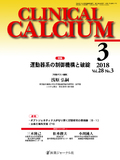Japanese
English
- 有料閲覧
- Abstract 文献概要
- 1ページ目 Look Inside
- 参考文献 Reference
関節リウマチは,代表的な炎症性自己免疫疾患である。治療には免疫異常を是正して疾患活動性を制御することを目的としてメトトレキサート等の合成抗リウマチ薬とTNF等を標的としたバイオ抗リウマチ薬が使用される。達成すべき治療目標は寛解であり,寛解維持により長期にわたる関節の構造異常や身体機能障害の制御が可能となった。また,バイオ抗リウマチ薬と同等の有効性を発揮する内服可能な薬剤として,シグナル伝達に重要なキナーゼであるJAKに対する分子標的合成抗リウマチ薬が登場した。一方,薬剤の長期連用による安全性,医療費負担,医療経済の問題は,国内外で喫緊の課題である。抗リウマチ薬の使用に際し,適切な薬剤選択,十分な治療前スクリーニング,定期的なモニタリング,及び,全身的管理が必要である。
Rheumatoid arthritis is a systemic autoimmune disease characterized by inflammation and joint damage that causes significant morbidity and mortality. Rapid and appropriate intervention using disease-modifying anti-rheumatic drugs(DMARDs)is prerequisite to halt joint destruction and long-term functional disabilities. Recent progress in the treatment strategy has brought about paradigm shift for the management of the disease, namely, the combined use of methotrexate, a synthetic DMARD, and a biologic DMARD targeting TNF, IL-6 and T cells has revolutionized treatment of rheumatoid arthritis. Clinical remission is now realistic targets for the treatment, achieved by a large proportion of rheumatoid arthritis patients, which leads to structural remission without damage in bone and cartilage as well as functional remission. Furthermore, orally available small but strong molecules targeting Janus kinase(JAK)are emerging. When DMARDs are prescribed, appropriate selection of DMARDs, adequate screening, regular monitoring and systemic management are required.



